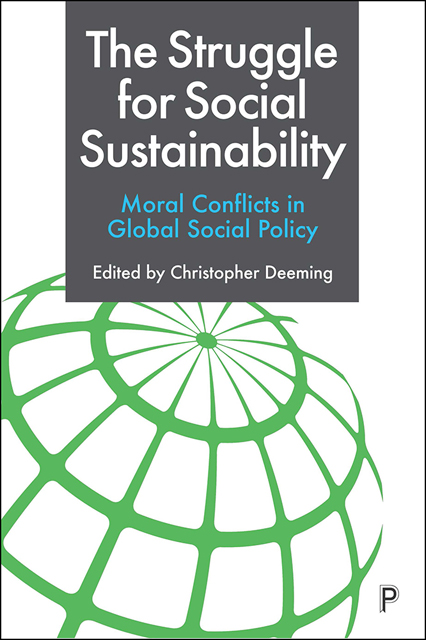Book contents
- Frontmatter
- Contents
- List of boxes, figures and tables
- List of abbreviations
- Notes on contributors
- Acknowledgements
- Preface
- 1 The ‘social’ in the age of sustainability
- 2 ‘No such thing as society’? Neoliberalism and the social
- 3 The social question: reconciling social and economic imperatives in policy
- 4 Disputing the economization and the de- politicization of ‘social’ investment in global social policy
- 5 The social dimension of sustainable development at the UN: from Brundtland to the SDGs
- 6 Paradigm lost? Blocking the path to ecosocial welfare and post- productivism
- 7 World population prospects at the UN: our numbers are not our problem?
- 8 Ageing sustainably
- 9 The political challenges to governing global migration and social welfare
- 10 Bringing in ‘the social’: an intersectional analysis of global crises and welfare
- 11 Global social policy and the quasi- concept of social cohesion
- 12 Putting the global in social justice?
- 13 ‘Go- social’? Inclusive growth and global social governance
- 14 For better or worse?
- 15 The struggle for social sustainability
- Index
10 - Bringing in ‘the social’: an intersectional analysis of global crises and welfare
Published online by Cambridge University Press: 14 April 2023
- Frontmatter
- Contents
- List of boxes, figures and tables
- List of abbreviations
- Notes on contributors
- Acknowledgements
- Preface
- 1 The ‘social’ in the age of sustainability
- 2 ‘No such thing as society’? Neoliberalism and the social
- 3 The social question: reconciling social and economic imperatives in policy
- 4 Disputing the economization and the de- politicization of ‘social’ investment in global social policy
- 5 The social dimension of sustainable development at the UN: from Brundtland to the SDGs
- 6 Paradigm lost? Blocking the path to ecosocial welfare and post- productivism
- 7 World population prospects at the UN: our numbers are not our problem?
- 8 Ageing sustainably
- 9 The political challenges to governing global migration and social welfare
- 10 Bringing in ‘the social’: an intersectional analysis of global crises and welfare
- 11 Global social policy and the quasi- concept of social cohesion
- 12 Putting the global in social justice?
- 13 ‘Go- social’? Inclusive growth and global social governance
- 14 For better or worse?
- 15 The struggle for social sustainability
- Index
Summary
Introduction
This chapter illustrates how an intersectional approach can excavate ‘the social’ in social policy analysis, not only at national and local/ interpersonal scales but at global scales too. It focuses on the forces at the global scale that have shaped the development of post-financial crisis (austerity) welfare and it explains how this should be understood in terms of the intersections between the crises of global financialized capitalism, of care, of ecology and of racialized transnational mobilities. In elaborating this framework, the chapter aims to extend the application of intersectionality to social policy, and, in line with this, to bring ‘the social’ into a political economy analysis of neoliberal welfare.
Intersectionality provides an understanding of social inequalities and power as complex, interlinked, shifting and multifaceted, constituting both penalties and privileges. It is an approach in which analysis and practice are closely linked (Box 10.1). It has enjoyed an important comeback in the social sciences and humanities since the 2000s from its origins in black feminist theory and politics of the 1980s. Yet the application to social policy of its contemporary tenets around theory, method and praxis has been both relatively limited and relatively recent. While it has been used to inform research and analysis of the multiple dimensions of social exclusion, discrimination and hierarchy at local and national scales in austerity welfare societies (for example, Bassel and Emejulu, 2018; Women’s Budget Group, 2017), less consideration has been given to developing an intersectional approach at a global scale, in spite of important feminist, post-colonial and ecological resistance to, and scholarship on, global capitalism.
Box 10.1: What is intersectionality?
Intersectionality is a way of understanding and analysing complexity in the world, in people and in human experiences. The events and conditions of social and political life and the self can seldom be understood as shaped by one factor. They are generally shaped by many factors in diverse and mutually influencing ways. When it comes to social inequality, people’s lives and the organization of power in a given society are better understood as being shaped not by a single axis of social division, be it ‘race’ or gender or class, but by many axes that work together and influence each other. Intersectionality as an analytic tool gives people better access to the complexity of the world and of themselves.
Source: Collins and Bilge (2020: 2).
- Type
- Chapter
- Information
- The Struggle for Social SustainabilityMoral Conflicts in Global Social Policy, pp. 195 - 216Publisher: Bristol University PressPrint publication year: 2021

